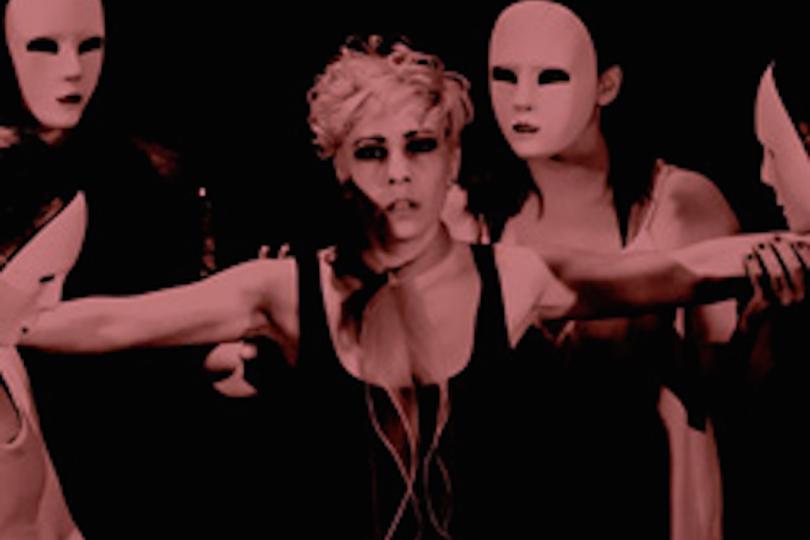Horror is back

While thanking the audience after his first Twin Cities Horror Festival performance of A Zombie Odyssey, writer-actor Ricky Coates noted that he’s performed the show at fringe festivals and other theater events around the country, but this is the only horror-specific festival he’s ever gotten to be a part of. Obviously we’ve got something pretty special here, as I’ve noted in my many previous pieces of TCHF coverage. Still, as any event ages into less of a cool anomaly and more of a local institution, there’s always the risk of things settling into predictability, especially in a festival that features work from the same tentpole companies every year.
That idea actually gets touched on in a bit of meta-commentary near the end of Four Humors’ Ubu for President as Brant Miller’s vulgarian politician taunts audience members who might be unsure how closely the show is hewing to the original: “I knew I should have read the play. I always read the source material before a Four Humors show!” It’s a clever acknowledgement of the company’s reputation for twisting up some familiar and fairly heady properties, and also a reminder that the crowd has come to these Horror Festival performances with a certain set of expectations.
The opening night of TCHF’s fifth installment, did to a certain extent, meet those expectations. All the usual suspects were here: the jet-black comedy with horrifying undertones, the dark adaptation of a classic folk tale, the blood-spraying thriller full of gory set-pieces, and something quirky about zombies. For those of us who never miss a festival, these things are getting to be familiar, but that doesn’t necessarily mean they’re getting stale.
Is it always this horrible?
Ubu for President is a horror show more in concept than in content, a slovenly, sardonic wallow in Alfred Jarry’s absurdist touchstone Ubu Roi. It’s the very loose story of a childish and endlessly obscene imbecile rising to political power via the council of his profoundly corrupt advisers. Given the current cultural climate, it’s tempting to see the production as a direct comment on the 2016 election, but the beauty of the Ubu character is that he can stand in for just about any politician of just about any era, depending on the audience’s leanings.
Brant Miller plays Ubu as a bloviating monster, incapable of making an ethical decision as he lumbers around the oval office spewing epithets and abusing his staff. Not that said staff deserves any better treatment. His military, business and religious advisers (Ryan Lear, Matt Spring and Jason Ballweber, respectively) are arguably more cynically slimy than their boss, with Ballweber’s child-lusting clergyman standing out as particularly odious. Ubu Roi has always been an alienating experience by its nature; it’s a disgusting, scatalogical, abrasive and very loud piece of satire that revels in its own crapulence. Ubu for President is absolutely not for all audiences, but in typical Four Humors fashion it’s a more thoughtful and insightful (not to mention funny) work than it might initially appear. You can read it as a skewering of America’s badly broken system, or you can look back at Ubu’s 120-year history and read it as an indictment of the fundamental brokenness of systems in general.
I’ll admit I came into A Zombie Odyssey with a bit of prejudice. Zombies have spent so much time at the forefront of the modern horror landscape that they’ve spun-off subgenres of subgenres (look up “zom-rom-com” for proof), and I feel like I’ve already seen every take on the topic that’s worth taking. Fortunately, Ricky Coates proved me wrong. Taking the point-of-view of an average guy slowly coming to the realization that he’s died and come back as something else is a fairly novel concept in itself, but A Zombie Odyssey really shines in its execution. It’s technically a one-man show, with Coates scampering about the stage and reacting to an empty landscape. In an impressive bit of sound design, tertiary characters appear only in voice-over, leaving Coates to fill in the blanks of their interactions via pantomime, inventive physicality and one wonderfully grotesque bit of puppetry.
And now, poignant zombie stories
There’s a point in the show where a character explicitly states one of this Odyssey’s major themes: that the dread-inducing power of zombies comes from the volume of their hordes, making a solo zombie kind of a pathetic thing. It’s a funny moment, but also rather a poignant one that underlines the loopy, lonely effectiveness of Coates’s peculiar vision. As a bonus, in spite of its sparse setting, A Zombie Odyssey manages to be one of the gorier entries in the festival.
Cheap Thrills Theater’s Cinderella: A Revenge Play stands as the most conventional entry in the opening night lineup, but even so, there are plenty of unexpected wrinkles to go around. This version casts Cinderella (Sydney Baker) as an abused child whose oafish father murdered her mother while she hid and watched. The “fairy godmother” is her mother’s spirit in the form of a magical raven who urges Cinderella to take vengeance on all who wrong her, from her father to her cruel step-family to the handsome prince whose motives may not be entirely pure.
It’s an intriguing and refreshingly grim take on one of the world’s most familiar tales. Not everything about it works - the story lags from time to time, the performances are uneven, and the action gets a touch repetitive - but it’s a visually and aurally arresting piece of theater. Writer-director Emily Wrolson maintains a chilly, gauzy tone that suits the play’s fairy tale origins and takes full advantage of the inherently spooky environs of the Southern stage. Ivy Benson’s costumes, Sean Evenson’s original score and Josiah Thompson’s choreography all shine throughout, culminating in a dreamy dance sequence at the royal ball. Taken all together, it’s a pleasingly off-kilter parable of the disenfranchised taking power by the only means available.
Delivering the gore, with more character
Over TCHF’s five-year run, the annual Dangerous Productions show has become arguably its main attraction. It’s another case where the crowd comes in with a pretty good idea of what they’re going to get: a twisty-turny narrative with some surprising reveals and a lot of blood. A lot of blood. Writer-director Tyler Olsen’s Senseless hits all of those marks with aplomb, but the returns aren’t quite as robust as in previous years.
Senseless follows trauma survivor Alex Kosto (Megan Koester), whose memoir of her childhood encounter with the eyeball-collecting serial killer who murdered her mother has made her a reluctant celebrity, on a visit to an Shutter Island-esque experimental psychiatric facility that seems to be hiding a fair number of secrets. This is a more character-driven show than previous Dangerous productions like Hear No Evil, Frankenstein and Epidemic. That allows for some standout acting turns from Koester and Garrett Vollmer as the genial orderly who bears the scars of the facility’s dark past, but the storytelling sometimes labors under the burden of character development. The company’s trademark gore, courtesy of RawRedMeat Productions, is as abundant and grisly as ever, but it feels more gratuitous and less organic to the story than in past years.
But perhaps I’m judging on an uneven scale. Flaws and all, Senseless is still a singular production that can’t be compared to much of anything else you’re going to see on a stage. I’ve always held that David Bowie’s “lesser” albums seem that way mainly because his best albums are so perfect. If we take for granted that Dangerous Productions is the David Bowie of Twin Cities-based gore theater (and I think that’s a pretty safe call), there’s not a thing wrong with mixing a Pin-Ups in with your Hunky Dorys and Station to Stations.




